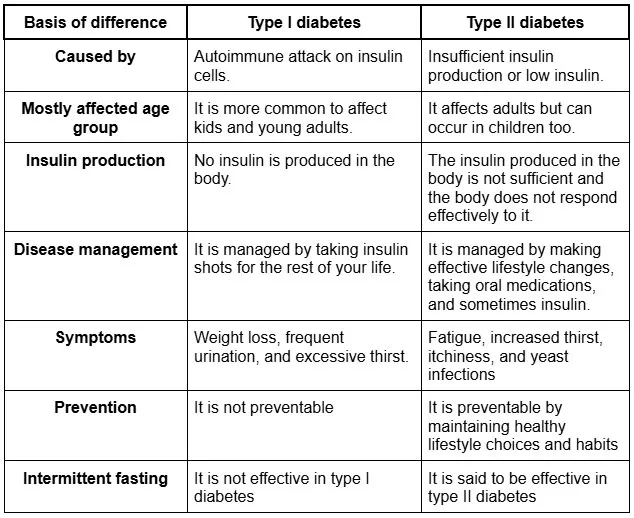
Intermittent fasting for type 2 diabetes: Is it safe?
As intermittent fasting is gaining attention for its said benefit of managing type 2 diabetes, is it safe for type 2 diabetes patients? Let’s discover more about intermittent fasting and its effects on type 2 diabetes patients to make safe diet decisions.
Table of Contents
ToggleIntroduction
Around 462 million people worldwide are affected by type 2 diabetes, and the number is increasing, which is a major concern. Type 2 diabetes is a chronic condition in which blood sugar levels excessively increase due to a lack of enough insulin in our body. People use various ways, like lifestyle changes, medication, etc., to manage this chronic condition. One of them has recently caught the attention of many people, which is intermittent fasting.
But do you know what intermittent fasting is? Let’s find out!
Difference between type I and type II diabetes
Diabetes is a chronic disease that occurs when the body is unable to produce enough insulin or can’t use it properly. Insulin is a hormone that regulates blood sugar levels. There are two types of diabetes, type I and type II:

Understanding intermittent fasting
Intermittent fasting is a specific schedule of eating and fasting times. It is a pattern created individually for each person to determine when they will eat and the hours they will fast. An intermittent fasting schedule focuses on when you eat and is not concerned with what you eat. The same fasting is continued for weeks or months. There are many different methods to perform intermittent fasting, like:
- The 16:8 method: This intermittent fasting schedule involves 16 hours of fasting and completing all your meals in an 8-hour window.
- Eat-stop-eat method: In this schedule, 24 hours of fasting is required once a week, and you can only consume calorie-free beverages like water and tea on fasting days.
- The 5:2 method: In this method, fasting is performed for the last 2 days, leaving the rest of the 5 days to eat normally.
- Alternate day fasting method: This type of intermittent fasting schedule is having alternate days of fasting and eating normally.
How does intermittent fasting benefit people with type 2 diabetes?
There are many benefits of an intermittent fasting schedule that help in improving and managing type 2 diabetes. Intermittent fasting helps in improving and managing type 2 diabetes. Intermittent fasting helps in weight loss for type 2 diabetes patients. Many healthcare organizations, including the National Institute of Health, have released studies on the benefits intermittent fasting offers for type 2 diabetes patients.
It improves blood sugar control by stabilizing the blood sugar levels in the fasting period and using stored glucose so the blood sugar does not spike after a meal. It also helps in reducing inflation in the body and improves heart health by calming blood pressure, cholesterol levels, and other chemicals.
Potential risks of intermittent fasting for people with type 2 diabetes
While intermittent fasting is beneficial for type 2 diabetes patients in many ways, some risks should be considered before performing fasting. People with type 2 diabetes need to actively maintain their blood sugar control. Intermittent fasting may lead to lower blood sugar due to restrictions on eating. Many signs of weakness like dizziness, nausea, insomnia, migraine headaches, and excessive hunger might occur, which can even pose limits in daily activities. There are many potential risks, like:
- Hypoglycemia
- Nutrients deficiencies
- Bodily stress
- Overeating during eating windows
- Negative impacts on heart health
Is intermittent fasting safe for people with type 2 diabetes?
Yes, intermittent fasting is safe for people with type 2 diabetes, but there is a crucial thing you must know before starting any form of fasting. Each person has different health needs and needs personalized advice from their doctor before performing any kind of intermittent fasting. It is also essential to follow the cautions carefully and care for yourself with healthy eating while fasting.
- Actively monitor blood sugar
- Adjust medications
- Consult your doctor properly
Tips and suggestions for intermittent fasting
- Start slowly: It is important to start slowly and give your body the time to adjust to fasting.
- Stay hydrated: During the fasting period, use low-calorie beverages to keep yourself hydrated.
- Monitor blood sugar: Timely check your blood sugar to look for fluctuations and keep a record of how it reacts to the fasting; consult your doctor if needed.
- Eat balanced, nutrient-dense diets: During the eating windows, keep your diets healthy and balanced with all the needed nutrients and avoid excessive carbs.
- Adjust medications: Talk with your doctor to adjust your medication with an intermittent fasting schedule and follow it.
- Take proper prescription: It is important to consult with your doctor before taking any step and keep taking prescriptions.
Conclusion
An intermittent fasting schedule has many positive impacts on people with type 2 diabetes and helps in managing the diet. Weight loss and blood sugar control make it effective for diabetic patients. However, many risks of intermittent fasting, like hypoglycemia, dizziness, migraine headaches, body stress, nausea, etc., also make it a part of the concern for patients. However, it is safe for people with type 2 diabetes to get proper guidance and take major steps, which are like monitoring blood sugar, making medical adjustments, and getting proper consultation from their doctor.
Hale Clinics has many expert consultants and updated testing technologies dedicated to offering you the best advice, showing you valuable insights, and helping you make beneficial decisions.
FAQs
Q1: Should type 2 diabetics do intermittent fasting?
Ans: It is safe to perform intermittent fasting for type 2 diabetes patients, but you should have individual consultation with your doctor to know if an intermittent fasting schedule is beneficial for you.
Q2: Who should not do intermittent fasting?
Ans: Women who are pregnant or breastfeeding should not do intermittent fasting.
Q3: Can type 2 diabetes be reversed permanently?
Ans: No, there is no known cure for type 2 diabetes but you can manage the chronic condition with many lifestyle changes and diet changes.
Q4: What should diabetics drink first thing in the morning?
Ans: While water is the best beverage for diabetics, you can also take drinks with no sugar and minimum calories, like black tea or green juices.
Q5: What is the best fasting method for type 2 diabetes?
Ans: Intermittent fasting is considered the best fasting method for type 2 diabetes, but you should consult your doctor before any fasting.
